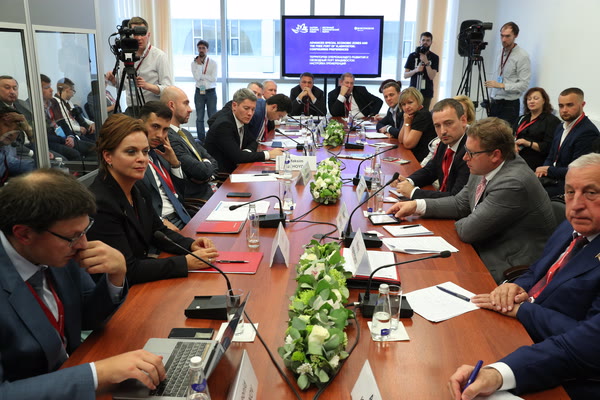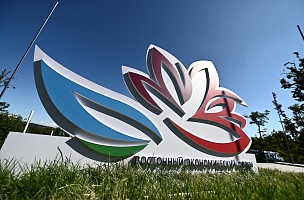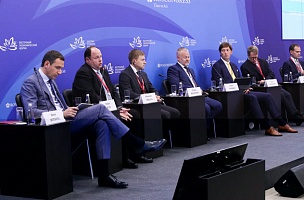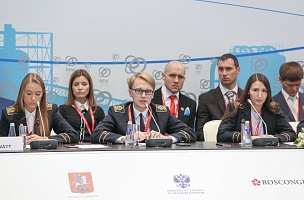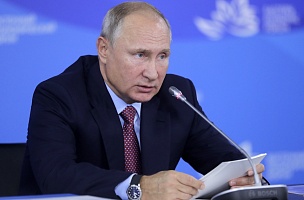KEY CONCLUSIONS
Preferential regimes in ASEZs and the FPV have had tangible economic impact
“The Forum is now celebrating its 5th
year, and we can say that very impressive results have been achieved across the
Far East. <…> A remarkable number of residents have shown interest in
ASEZs and the Free Port of Vladivostok, and we have seen impressive figures for
the numbers of enterprises developed, projects implemented and, most
importantly, plans announced for the period to 2025,” Leonid Agafanov, Member
of the Public Council of the Ministry for the Development of the Russian Far
East and Arctic; Managing Director, EastRussia.
“Incomes of ASEZ residents grew from RUB 15.5
billion in 2016 to RUB 70 billion in 2018, while those of FPV residents grew
from RUB 2 billion to RUB 24.5 billion. Over 80 projects have been implemented
with an investment volume of RUB 100 billion, and around 10,000 jobs have been
created. Secondly, the majority of ASEZs and the FPV are expecting an increase
in the total volume of their tax and non-tax budget revenue. Thirdly, according
to data from 2018, labour productivity increased on the previous year,” Nikolay
Kharitonov, Chairman of the Committee for Regional Policy and Issues of the
North and Far East, State Duma of the Federal Assembly of the Russian
Federation.
“Financial models, these benefits, and part of
the money provided by the government have played a significant role. Our
project was on the verge of making a loss, and was hovering around the zero
mark, but it is now moving in the right direction, including with respect to
opportunities for exporting coal to premium Southeast Asian markets,” Yury
Tyamushkin, General Director, VaninoTransUgol.
Support
institutions actively cooperating with ASEZ and FPV residents
“Our experience of implementing projects in ASEZs and the FPV has been a
success. We have projects up and running worth RUB 700 million – in our view
this is not a bad start,” Roman Kapinos, Deputy Chairman of the Board, SME
Bank.
“The Far East Development Fund is making active efforts to support
residents <…> To date, we have provided almost RUB 38 billion in financing,
just under half of which went to ASEZ representatives and FPV residents.
<…> This means preferential financing at a rate of 5% per annum in the
case of big businesses. <…> Residents are generally getting financed,”
Kirill Kamenev, Managing Director of Investment Department, Far East and Baikal
Region Development Fund.
PROBLEMS
Regulatory
shortcomings and irregularities
“Federal Law No. 300 came into force in August 2018, introducing
amendments to statutory regulations that worsened the position of the taxpayer.
This is a very dangerous trend, and could lead to negative consequences for
residents’ activities, going as far insolvency and bankruptcy. <…> The
image and attractiveness of the ASEZ tax regime and the development of the Far
Eastern territories as a whole are being weakened,” Anna Tsivileva, Chairman of
the Board of Directors, Kolmar Group.
“In August 2018 all residents and investors were hit with new rules,
which amount to changing the conditions for providing benefits. If the rule
initially stipulated that the status granted the right to make use of benefits
and reduced tariffs on insurance premiums, then in the revised version there is
a requirement to observe several conditions, including the creation of new
jobs. <…> The situation that has arisen is not ideal for residents,” Olga
Surikova, Head of Far East Practice, KPMG in Russia and the CIS.
“We realize that the legislation is undergoing fine-tuning, but we have
also fallen into the same trap. Since we were among the first residents, our
residency agreement contained neither a list of jobs nor a limit. A desk audit
is now being conducted. It is unclear what actions the tax authorities will
take next,” Alexander Shumatov, General Director, Children’s Health Centre.
“Expedited VAT refunds. It would appear that the issue has been resolved
from a regulatory perspective, but due to a lack of earmarked funding from the
FEDC (Far East Development Corporation) guarantees cannot be given to the tax
authorities and, as a result, it is impossible to implement expedited VAT
refunds at present,” Denis Gros, Managing Partner, DA! Development Group;
Executive Director, Avangard Industrial Park.
“Of the problems that are now coming to a head, we know that there is a
pending amendment to the Land Code regarding benefits in relation to the
provision of FPV land without tender procedures. <…> If it is passed, if
this benefit is lost, then we will see an erosion in the confidence of business
in the economic regime,” Anton Skorik, Chairman, Vladivostok Free Port
Residents Support Association; General Director, Renaissance.
SOLUTIONS
Securing a stable
environment for investors
“Investors should be guaranteed the benefits
and conditions for receiving them that they were offered and on the basis of
which they signed up to the ASEZs and planned their business models. <…>
We would suggest submitting all draft amendments to existing rules in the Tax
Code that affect residents for public discussion,” Anna Tsivileva, Chairman of the Board of Directors, Kolmar Group.
Creating ASEZ and
FPV residents’ associations
“There is a wonderful Far East Development Association. I would fully
endorse an ASEZ Resident Association. They are a very good idea, because they
allow you to achieve consensus and help federal agencies in their work,” Pavel
Volkov, State Secretary, Deputy Minister for the Development of the Russian Far
East.
“I believe that the time has come for ASEZ residents to come together.
We have taken the first steps in this direction. A constituent meeting of ASEZ
residents was held in early August. The documents are now with the Ministry of
Justice. Nobody except us is going to make our proposals a reality,” Denis
Gros, Managing Partner, DA! Development Group; Executive Director, Avangard
Industrial Park.
Customs reliefs for
ASEZ and FPV residents
“The main problems faced by residents of the FPV and ASEZs <…> are
major requirements for the provision of customs clearance areas. What has been
done in this area is that changes have been introduced to the provision order
that take into account the views of our residents. <…> Bureaucratic
delays are possible. To this end, a separate working group has been established
in every customs office, consisting of divisions for customs clearance and
providing relief for payments made when working with residents,” Gleb Kicha,
Acting First Deputy Head, Far Eastern Customs Directorate.
“The Corporation also believes that customs clearance areas should be
optimized, with improvements made to the process including the removal of
fences and the use of cutting-edge digital accounting methods for tracking the
flow of goods,” Aslan Kanukoev, Acting General Director, Corporation for Far
East Development.


